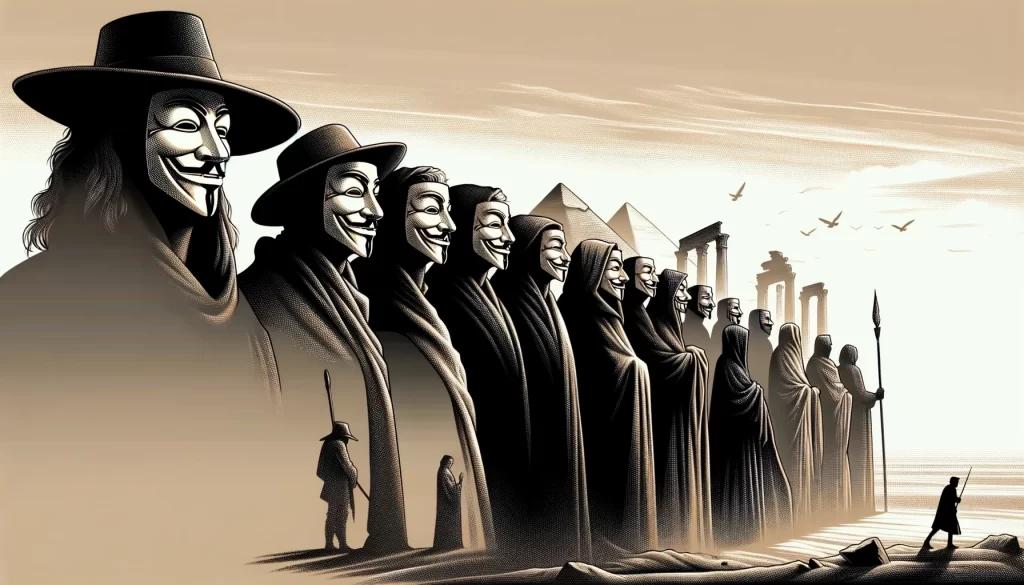Introduction In the annals of digital culture and activism, few names evoke as much curiosity and controversy as Anonymous, a decentralized group of activists and hackers. Known for their distinctive Guy Fawkes masks and a penchant for dramatic flair, this group has left a significant mark on global events over the past two decades. This article explores the history, activities, and enduring impact of Anonymous, shedding light on its origins, key operations, and the philosophical underpinnings that have guided its members.

Origins and Ideology Anonymous first emerged from the chaotic and often irreverent forums of 4chan in the early 2000s. What started as a collective of like-minded individuals engaging in pranks and memes soon transformed into a more purpose-driven entity focused on activism and freedom of information. The group is broadly characterized by its decentralized nature; there are no leaders, no official members, and no formal hierarchy. This structure is both a strength and a weakness, lending the group flexibility and resilience against counterattacks while sometimes leading to fragmented efforts and contradictory goals.
The ideological backbone of Anonymous is rooted in the belief in freedom of expression, privacy rights, and resistance against censorship. Members, often referred to as “Anons”, are united by a shared disdain for oppression, whether it manifests in politics, social issues, or corporate governance. The iconic Guy Fawkes mask, popularized by the graphic novel and film “V for Vendetta”, symbolizes their commitment to these ideals and their collective anonymity.
Key Operations and Impact Anonymous has been involved in a myriad of operations that highlight its global reach and its capacity to engage in cyber activism. One of the earliest significant operations was Project Chanology in 2008, which targeted the Church of Scientology. Anons launched a series of successful cyber-attacks and public protests in response to the Church’s attempts to suppress online criticism and content. This operation put Anonymous on the map and demonstrated the power of coordinated, anonymous online activism.
The group also played a significant role during the Arab Spring movements in 2010 and 2011. They provided support to protestors in Tunisia, Egypt, and other countries by attacking government websites, monitoring police communications, and helping to circumvent internet blackouts imposed by those regimes. This not only facilitated the flow of information but also showcased the potential for digital activism to have real-world impacts.
In the United States, Anonymous has undertaken numerous operations against different targets, ranging from defending LGBTQ+ rights to exposing corruption. Operations like OpSafeWinter, initiated to help homeless people by organizing shelters and donations, display the group’s capacity for social advocacy beyond its typical cyber-attacks.
Controversies and Criticism Despite its achievements, Anonymous has faced criticism and controversy. The group’s tactics, particularly its use of illegal hacking, have been questioned in terms of ethical validity and long-term effectiveness. Furthermore, the lack of a coherent structure has sometimes resulted in misguided operations that have harmed innocent parties or diluted the focus of their activism.
Moreover, the anonymity that empowers them also allows individuals to act maliciously under the guise of the group’s name, leading to disparate actions being wrongly attributed to Anonymous. This has complicated public perceptions and the legal pursuits against alleged members.
Legacy and Future The influence of Anonymous on both cyber culture and activism is undeniable. The group has inspired a generation of activists and hackers, highlighting how digital tools can be leveraged for political and social change. The legacy of Anonymous is also evident in the way cybersecurity is handled by governments and corporations, prompting stronger measures against hacking and greater scrutiny of information security.
As we advance into an increasingly digital future, the role of groups like Anonymous could evolve in unexpected ways. Issues of digital privacy, freedom of information, and internet governance are more pertinent than ever, suggesting that the spirit of Anonymous will continue to resonate and adapt in the face of new challenges.
Conclusion Anonymous remains an enigmatic force in the world of digital activism. With no faces to associate with and no formal structure, the group represents a modern form of protest—one that is faceless yet impactful, chaotic yet purposeful. As the digital landscape continues to evolve, so too will the tactics and influence of this unique collective. Whether seen as vigilantes or heroes, Anonymous continues to be a powerful symbol of resistance against oppression in the digital age.